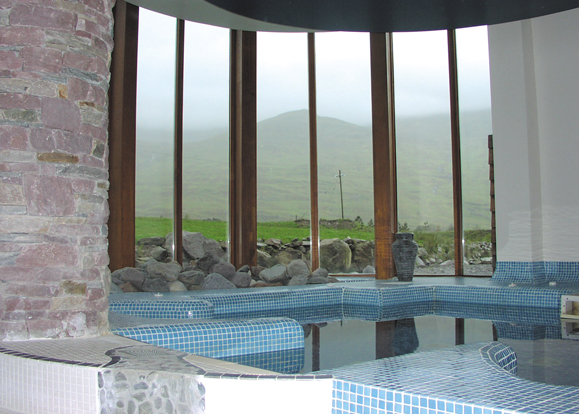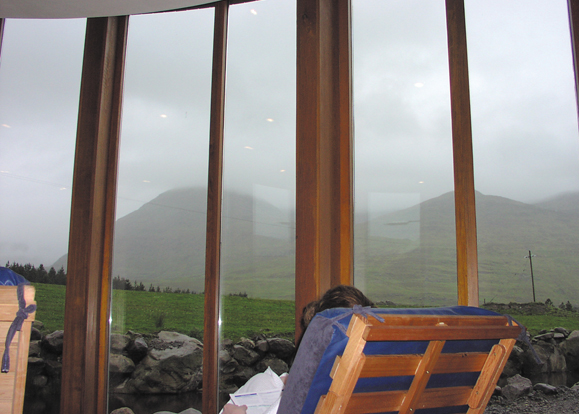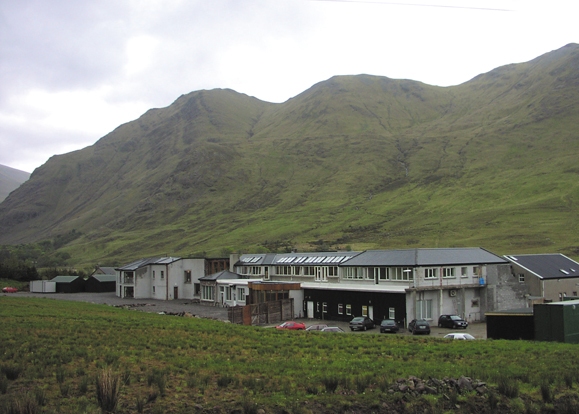On a drizzly morning in early summer — what the Irish refer to as a “soft day” — I’m doing something that has become rather commonplace during my numerous travels to Ireland. I’m talking about local history with two men who live in County Mayo and work at the Delphi Mountain Lodge and Spa. We stand at the entrance to a business that was constructed with the entrepreneurial idea that what the Celtic Tiger needed — after a decade of scrambling to increase its productivity, efficiency and therefore its living standard — was a good pampering of the body and spirit. We are a few feet from a wonderful turf fire burning in a round stone fire-place, tucked at the foot of the Mweelrea Mountains, some of the most beautiful and ragged geography in the west of Ireland. We are poring over events that took place over a century ago but which are expressed with an enthusiasm that makes it seem like they happened yesterday.
A middle-aged woman from Dublin walks through the lobby in a white terrycloth robe heading for a facial or bodywrap as Eddie Nee, the maintenance supervisor at the Delphi Lodge, talks passionately about his long-term project of collecting the memories and stories of the “old ones” of the area before they pass on. Nee needs to act fast, fearing that the wonderful oral tradition of Ireland, the passing of family and social narrative on from one generation to another, will soon disappear.
Ireland deserves a little R and R. Dublin and other large cities have become no less congested, stressful and aggravating than any other populated urban center in Britain or on the European continent. The Ireland of John Ford’s Quiet Man, with its misty rosy colored portrayal of a quaint Emerald Isle, may not be completely gone, but it is surely fraying around the edges. There is increasing fear among Irish academics, journalists and even psychologists that the price that Ireland is paying for its “progress” — several years of the highest economic growth rates in Europe — may be too steep. Has a coarsening of the soul taken place, they ask, as the standard of living has increased?
Michael O’Driscoll, the general manager of the lodge, sees the paradox of Ireland’s advance clearly. He is a soft-spoken man who has been in County Mayo for three years, stopping in the area because it “just felt right.” “Irish people have come to stress and wealth later than most,” he says philosophically. “Now both partners have to work and the way work is organized has dramatically shifted. That affects every aspect of our being.” At Delphi, every aspect of one’s being is attended to — mind, body, and spirit — with a treatment regimen that includes various massage therapies, stress management, hydrotherapy and mud wraps. There is even an “adventure center” that offers hiking, surfing and dramatic pontoon boat trips up the Killary Harbour towards the open sea.
O’Driscoll also recognizes that sacred quality of the surroundings where the lodge is located, an hour-and-a-half north of Galway near Leenane. He worked closely with the owners and architects before the hotel and spa was built, to make sure that the building itself both fit into the geographic landscape and reflected the ancient Celtic soul that seems to bathe the local terrain in a special atmosphere. “The Irish spirit comes to you through the subconscious,” he suggests, pointing to the rock garden at the entrance to the front door subtly arranged to resemble Newgrange, the 5,000-year-old passage tomb located north of Dublin.

Mircea Eliade, a historian of religion, defines sacred space as a kind of permeable boundary between the prosaic world of everyday life and the ethereal world of the transcendent. It serves as a spiritual axis around which “religious” people orient themselves, a fixed point of reference. Architect Frank Ennis, who had experience designing other hotels and spas, looked for ways to add an historical and spiritual touch to the craftsmanship and design details of Delphi, with an eye towards Eliade’s concept of sacred places. “It was a special project for me,” Ennis recalled from his office in Dublin. “Every decision, from the wood we used to the stones and the shape of the walls, was informed and nurtured by a sense of obligation to the beauty of the surroundings and with an eye to the significance of the area’s past.”
All the timber is storm-felled, meaning that no farmed trees were used in construction. And the ubiquitous stones are from the surrounding area, creating the feeling that the building was simply built around them. There are rounded doors, circular meandering corridors and pervasive spiral and concentric circle designs on the tiles, also reminiscent of the etchings on the megalithic (from the Greek megos, large, and lithos, stone) rocks at Newgrange. There is a great deal of conjecture among historians about their meaning and purpose, with some scholars believing that the swirling designs are evocative of the sun, the moon or even an abstract depiction of the human face.
The wood used in building was particularly significant for Ennis, serving as both a literal and spiritual foundation for the lodge. “The ancient Irish placed a great deal of significance in trees in terms of their mythical qualities,” Ennis said. “They were venerated and invested with the qualities of wisdom and stability which is the ethos of the spa as well.”
What is offered at Delphi is emblematic of a changing Ireland — a shift in income altering and expanding the choices for the use of leisure time. But it is also symbolic of the reach of globalism, the integration of Far Eastern therapeutic and meditative practices into a culture which not too many decades ago was considered “insular.” A shiatsu massage at Delphi involves a geographic journey into the west of Ireland and a mental journey to the Far East of Japan. According to Steve Mullen, the health fitness manager who grew up in Mayo and talks like ancient Druids could have trained him, the power of the surrounding mountains provides an unexpected ameliorative power. “The energy is so strong and positive it overwhelms any negativity.”
The “negativity” Mullen refers to is of course the historic legacy of the Irish famine of the mid-19th century, which devastated County Mayo. If “silence is our truest language,” as historian Terence Brown wrote, referring to one of the famine’s psychological consequences, there is the silence of willful forgetting, a kind of social amnesia, and the quiet of solemn contemplation. At Delphi, O’Driscoll knows that for healing to take place, remembering and restoration are essential. “People try to forget the past, but what’s the point? It happened.”

The Delphi Mountain Lodge is the newest location of a burgeoning spa industry in Ireland. Forty minutes north of Delphi in Wesport is the Rosmoney Day spa, and the Powerscourt Spa in Wicklow caters to Dublin’s growing professional class. And for a completely different feel, there is Kilcullen’s Seaweed Baths in Enniscrone, County Sligo, which was built in 1912 and still retains its Edwardian ambience, complete with large porcelain bathtubs and cedar steam closets operated by a wooden lever that controls the release of steam.
The events of September 11th have damaged the tourist industry world-wide, including Ireland. The Delphi Lodge has so far mainly attracted people from throughout Ireland but the owners and managers have their eyes set on the American market. “We are very impressed with what the Americans have done in their leisure industry,” owner Patrick Shaughnessy observed. “We have a rich Irish heritage that is special and shapes the way we approach our free time. We want Americans to experience it.” ♦


Leave a Reply